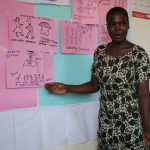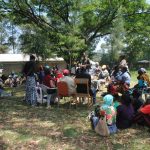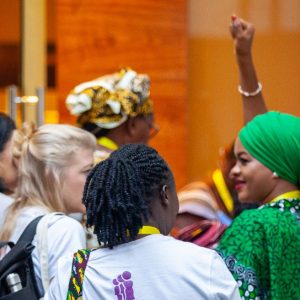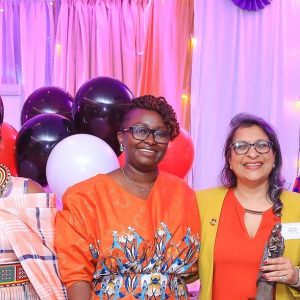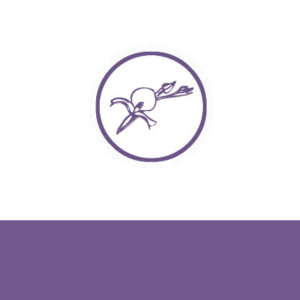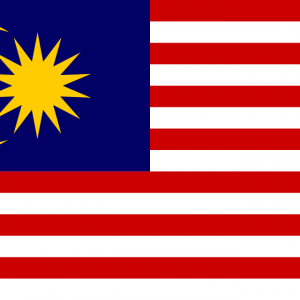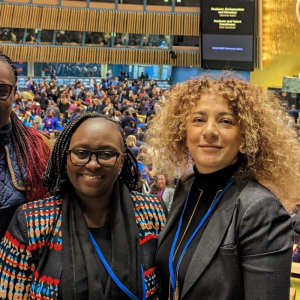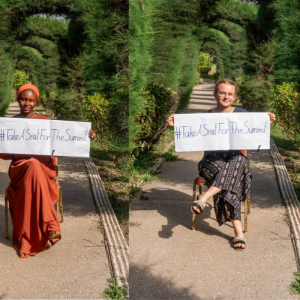Since January this year, we have been working with ECAW (Education Center for the Advancement of Women) and Feed the Minds to support the abandonment of FGC in Kenya. Through ECAW’s strong community networks this project protects and empowers young girls and women, at the same time as challenging the communities’ attitudes towards the practice. You can find out more about the project by clicking here. Our Knowledge and Programmes Co-ordinator Lucy has been out to visit…
Day 2
The day began with a great session – ECAW paralegals drew what they thought a community that was ready to abandon would look like, where their communities are now and what is needed to shift their communities toward abandoning FGC.
The next outreach event we attended was a parent stakeholder meeting. Here it was acknowledged that calling girls mosagane – an offensive term for an uncut girl – is abusive and can push girls to be cut. It was decided that the use of this word should be discussed in continual dialogue.
Again, from community opinions, ideas and suggestions it was clear that FGC is a topic that concerns people but much sustained dialogue engaging the whole community is needed for the norm to shift and people to be able to not cut openly; one woman remarked that if a woman is not cut then husbands and wives should keep it to themselves to avoid stigma and the possibility of a woman being cut during childbirth against her will.
Day 3
The celebrated public event when girls are cut is dictated by the decrees from the Council of Elders, which decides when circumcision should take place. This is an issue particular to Kuria and is taken into account by ECAW in their work on the issue. It is understood that spirits play a key role within the process and will influence girls who have not been cut. Furthermore, cutters are seen to be chosen by these spirits and thus feel it is their duty to cut girls, following orders from the Elders.
This became clear when we met the secretary to the Council of Elders at a community forum in Taranganya who talked of the effect of the spirits and their work in the preparation of the cutting ceremony. However, he did say that there was a possibility of change – something called for by other members of the forum who suggested uniting to advocate for change. Change was said to be underway – with uncut girls hand in hand with cut girls – although the community still have a way to go to abandoning the practice.
The forum was facilitated by Mary – ECAW’s lead paralegal – an enthusiastic and passionate facilitator with a fantastic ability to hold a space. She says:
“My confidence has increased since working with ECAW. People within my immediate community are copying me and not cutting their girls”.
Day 4
Our day began with a workshop engaging health professionals at the local district hospital. Josephine – ECAW’s Finance Officer – facilitated the session and began with a short story that introduced Gertrude, a grandmother who had heard about the negative impacts of FGC who decides to ask Ruth, a healthcare professional, to cut her granddaughters to minimise risk in hygienic conditions. The various responses from the health workers revealed a lot about the medical situation around FGC in Kuria. Within this forum, health, participants acknowledged that FGC does happen in medical settings – a fact that ECAW, FTM and OP had guessed at but one that we had not heard explicitly from health professionals. It was said that there is no such thing as a ‘safe cut’ and that it is the duty of healthcare professionals to educate on the impacts of FGC – both the negative effects and surrounding issues so that a ‘safe cut’ is not seen to be an answer. A health professional’s role was seen to be to appreciate culture and advocate for women. However, the need for whole community engagement was stated by one man:
“You may change Gertrude’s mind but at home she may still be forced into cutting her granddaughters. We must change the attitude of the whole village”.
Healthcare workers called for a network of organisations to be involved in forums where they can come together – health workers, the children’s department, the judiciary, security, NGO’s, CBO’s – ECAW’s role in coordinating this will be vital. The passion health workers had for working on the issue was inspirational, with a widespread call for them to be involved before the cut happens. This rarely happens and they are involved too late, looking after many girls who are suffering the effects, especially after the cutting season when wards may be full of cut girls.
The social sanctions that affect uncut girls and women were widely acknowledged as a factor that result in pressure to be cut, including the cutting of women during birth without their consent. Another issue that was raised is that many girls avoid being cut until age 18 so they can stay in school, but then go for cutting once graduated in order to be socially accepted. ECAW plan to further discuss and develop work on this.
One health professional called for her colleagues to talk to parents. Another man called for continuous education throughout the year in forums, and a woman said that information coming through schools and churches is vital as so much time is spent here – again, ECAW’s work in the area can really enable these things to happen.
The workshop ended with a conclusion from the hospital boss:
“If we put our suggestions into actions, if we partner together, there is a light at the end of the tunnel”.

